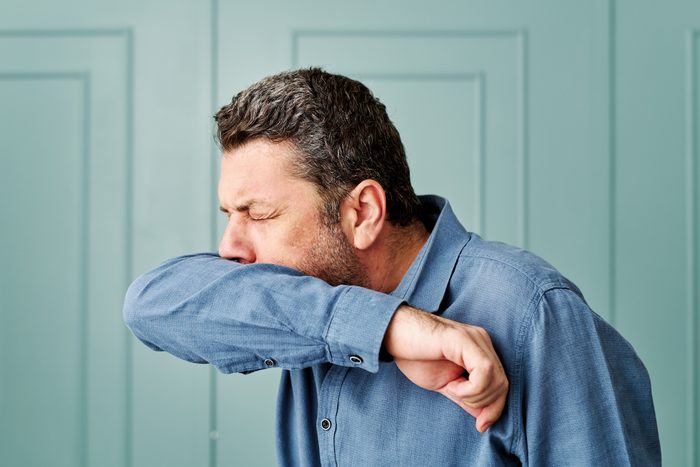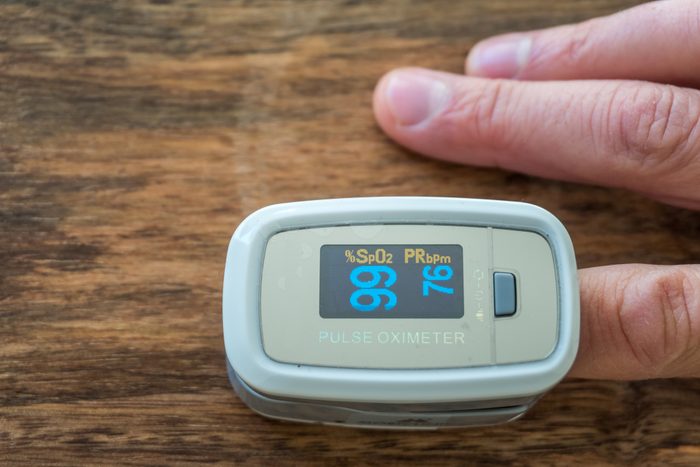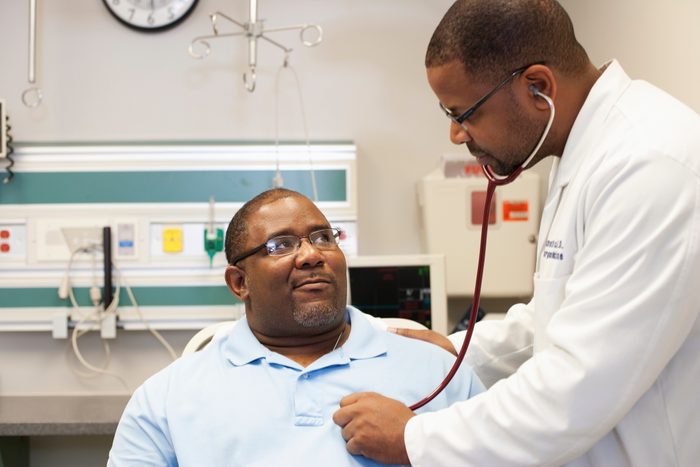What is congestive heart failure?
Congestive heart failure (CHF) occurs when blood flow is compromised because your heart isn’t pumping efficiently, according to the American Heart Association (AHA). This means that the blood flow to your heart can back up throughout the body, while oxygenated blood flowing from your heart isn’t sufficient to meet your body’s needs. As a result, people will experience the following CHF symptoms.

You’re out of breath
One of the first CHF symptoms is shortness of breath during normal daily chores or errands. “When the heart is impaired, blood backs up into the lungs, making it hard to breathe,” says Gregg Fonarow, MD, spokesperson for the AHA and co-chief of the UCLA division of cardiology in Los Angeles, California. “Patients present differently, but for some, the most disturbing symptom is this shortness of breath. It can get so bad that people have trouble breathing even during rest.”

Your footwear doesn’t fit
The buildup of excess fluid in the body’s tissues, called edema, causes swelling most commonly in the feet and legs. “People may notice their shoes feel tight or their socks make lines on their ankles,” says Dr. Fonarow. In addition, with heart failure, the kidneys are less able to dispose of water and sodium, which also contributes to the retention of fluid in the tissues, according to the American Heart Association (AHA). (Check out these 12 heart health breakthroughs that could save your life.)

You’re coughing and wheezing
The backup of fluids could also trigger a congestive heart failure cough, says Dr. Fonarow. “It’s because of this CHF symptom that heart failure can sometimes be misdiagnosed as asthma or bronchitis,” he explains. A cough that worsens at night and when lying down could be a sign of acute pulmonary edema, a condition in which too much fluid accumulates in your lungs. This requires emergency attention, according to the Mayo Clinic. (Learn more about how symptoms differ in the four stages of heart failure.)

You’re always worn out
Simple activities like climbing stairs or vacuuming could leave you feeling lightheaded and fatigued. When the heart can’t pump enough blood to meet the body’s needs, the body compensates by diverting blood away from less vital organs—especially muscles in the limbs—and re-routing it to the brain and heart, according to the AHA. This fatigue is another symptom of congestive heart failure that can become particularly bothersome to patients, says Dr. Fonarow: “It can get so debilitating they can’t get through their daily activities.”

You’re sick to your stomach
Some people with congestive heart failure notice decreased appetite or nausea due to the fact that the digestive system is getting less blood, which could lead to an upset stomach, says the AHA.

Your heart is working overtime
“If some people were to check their heart rate, they would see it’s actually increased, and some might experience palpitations,” says Dr. Fonarow. This is because the heart is working harder to make up for its reduced pumping capacity. (Find out if high blood pressure makes you tired.)

You notice these symptoms gradually … or maybe all of a sudden
Depending on the underlying cause—whether a history of high blood pressure, diabetes, or heart damage from a heart attack—heart failure could strike in different ways. “Sometimes it’s subtle and develops over time, and sometimes it’s more dramatic,” says Dr. Fonarow.

You have certain congestive heart failure risk factors
Anyone who is already at risk for heart health issues should be particularly alert if they start to notice these CHF symptoms. Risk factors include being over the age of 65 (the heart muscle can weaken with age), being overweight (excess pounds strain the heart), and having suffered a heart attack (the resulting damage can weaken the heart), says the National Heart, Blood, and Lung Institute (NHLBI). Children with congenital heart defects may also develop heart failure.

You continue to feel worse, not better
If you notice these symptoms of congestive heart failure and don’t see a doctor, your condition will worsen. “You may begin to feel tired and short of breath after getting dressed or walking across the room,” states the NHLBI. “Some people have shortness of breath while lying flat.” Dr. Fonarow warns that it’s crucial to identify the condition before it progresses to an emergency because heart failure left untreated is an extremely dangerous downward slope. “The survival rates with untreated heart failure are worse than with most cancers. Without adequate treatment, people will not be alive within five years of diagnosis.”

With heart failure treatment, you feel incredibly better
Once you seek medical help, it’s your physician’s job to determine the underlying cause of the disorder and plan the right treatment—a job made more difficult by the fact that these CHF symptoms can also be caused by other conditions (including respiratory infection, an enlarged heart and COPD). The good news is that medication works very well to improve the quality of life and extend the life span. “The progress in the treatment of heart failure over the past 20 years has been nothing short of remarkable,” says Dr. Fonarow. “There are now extremely effective medications that can help prevent the disease from getting worse and dramatically improve survival.” Next, check out these 30 other ways to reduce your own risk of heart disease.
